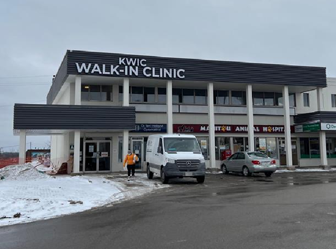



Worried about HIV, STD, or STI? KWIC Walk-In Clinic is here for you! We understand that getting tested for sexually transmitted infections can be a stressful experience. That’s why we offer confidential, reliable HIV, STI/STD testing service in Kitchener with fast, accurate results and a doctor consultation. To find out if someone has HIV test in Kitchener and other cities, they must take an HIV test (human immunodeficiency virus). Immune system cells can become infected and harmed by the HIV virus.
It can be overwhelming to choose the suitable testing options among Early Detection HIV Test (HIV RNA PCR Test), Rapid Blood Test, or HIV Testing 4th Generation. KWIC Walk-In is STD & HIV test clinic in Kitchener offer affordable and reliable testing, counseling, and treatment options and free home sample collection (online HIV testing) for your convenience. With KWIC Walk-In Clinic, you can take control of your sexual health without any hesitation as there is always an HIV test in Kitchener.
Here, you can choose the service that best suits your needs:
- HIV Testing in Kitchener: Get Fast, Accurate & Confidential Results
- STD Testing in Kitchener: Comprehensive Screening & Peace of Mind
- STI Testing in Kitchener: Confidential and Comprehensive Testing Services
Our clinic offers confidential and comprehensive testing services for HIV, STDs, and STIs to promote sexual health and well-being. Our goal is to provide a safe, non-judgmental environment where individuals can receive the care they need.
HIV Test in Kitchener
Rapid HIV Testing: Results available within minutes.
Routine HIV Testing: Comprehensive testing with follow-up counseling.
Post-Exposure Prophylaxis (PEP): Medication available for those exposed to HIV within 72 hours.
Pre-Exposure Prophylaxis (PrEP): Preventive treatment for those at higher risk of HIV.
STD/STI Tests in Kitchener
Gonorrhea: Urine or swab tests to detect these common infections.
Syphilis Testing: Blood tests are available to detect syphilis.
Herpes Testing: Swab tests or blood tests for herpes simplex virus (HSV).
HPV Testing: Pap smears and tests for human papillomavirus, along with vaccination recommendations.
Hepatitis Testing: Testing for Hepatitis B and C infections.
Why Choose Us?
Expert Staff: Trained healthcare professionals who specialize in sexual health.
Non-Judgmental Environment: A supportive space for all individuals, regardless of gender, orientation, or background.
Easy Access: Walk-ins and appointments are available, with convenient operating hours.
We are here to help you take control of your sexual health. Regular testing is essential to stay healthy and protect your partners. Visit us today for professional, respectful, and compassionate care.
FAQs about HIV & STD/STI Testing in Kitchener
What are the symptoms of HIV?
Early symptoms of HIV infection include flu-like symptoms such as fever, sore throat, and fatigue. As the virus progresses, it may lead to more severe symptoms like weight loss, fever, diarrhea, and cough. However, many people may not show symptoms for years.
What is the difference between HIV 1 and HIV 2?
HIV-1 and HIV-2 are two types of viruses that cause HIV infection. HIV-1 is the most common globally and more aggressive, while HIV-2 is mostly found in West Africa and progresses more slowly to AIDS. There are also differences in their genetic makeup, affecting how they respond to certain treatments. Identifying which type a person has is crucial for effective treatment strategies.
How long do the HIV test reports take?
Usually, the labs are able the give reports within 24 to 48 hours for the lab tests for HIV like antigen/antibody screening tests. The reporting time can be longer sometimes since this also depends on factors like the transit time of the sample to the main testing lab, the waiting time at the lab, the processing time of the lab, etc.
Where can I get tested for HIV/STD in Kitchener?
You can visit Government hospitals, private hospitals, and specialized centers like KWIC Walk-In Clinic
What are STDs/STIs?
STDs/STIs (Sexually Transmitted Diseases/Infections) are infections that spread through sexual contact. They include HIV, gonorrhea, chlamydia, syphilis, oral herpes, genital herpes, hepatitis B, hepatitis C, HPV, trichomonas, Gardnerella, etc.
How can I prevent STDs/STIs?
Practicing safe sex, using condoms consistently and correctly, limiting sexual partners, and getting vaccinated (e.g., HPV vaccine and Hepatitis B vaccine) can reduce the risk of STD/STI transmission. Post-exposure prophylaxis or PEP for HIV is also a powerful tool to prevent HIV infection.
Who should get tested for STDs/STIs?
Anyone who is sexually active should consider getting tested, especially if they have multiple partners. If you have had a recent exposure with someone you do not know well, had unprotected sex, or failure of protection, you should consider getting screened for STIs. STIs may or may not have symptoms for months to years, hence relying on symptoms is not advisable. Common STD/STI tests include blood tests, urine tests, and swab tests.
How accurate are STD/STI tests?
STD/STI tests are generally accurate, but false negatives can occur, especially during the window period when the infection may not be detectable. It’s crucial to follow up with healthcare providers for guidance.